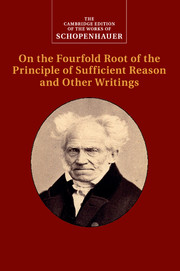Book contents
- Frontmatter
- Contents
- General Editor’s Preface
- Editorial Notes and References
- Introduction
- Notes on Text and Translation
- Chronology
- Bibliography
- Collation of the Two Editions of On the Fourfold Root
- 1 On the Fourfold Root of the Principle of Sufficient Reason
- 2 On Vision and Colours
- 3 On Will in Nature
- Glossary of Names
- Index
Fifth Chapter - On the Second Class of Objects for the Subject and the form of the Principle of Sufficient Reason Governing in it
Published online by Cambridge University Press: 30 June 2022
- Frontmatter
- Contents
- General Editor’s Preface
- Editorial Notes and References
- Introduction
- Notes on Text and Translation
- Chronology
- Bibliography
- Collation of the Two Editions of On the Fourfold Root
- 1 On the Fourfold Root of the Principle of Sufficient Reason
- 2 On Vision and Colours
- 3 On Will in Nature
- Glossary of Names
- Index
Summary
EXPLANATION OF THIS CLASS OF OBJECTS
The only essential distinction between humans and animals (which has always been attributed to reason, a very special cognitive faculty exclusive to humans) is based on the fact that humans have a class of representations which no animal shares: these are concepts, that is, abstract representations, as opposed to the intuitive representations from which, however, concepts are derived. The immediate result of this is that animals neither speak nor laugh, but the mediated result is the many and significant ways in which human life is distinguished from that of the animal. For a different sort of motivation has now come about through the addition of abstract representations. Although the actions of humans follow with no less strict necessity than those of animals, because of the kind of motivation humans have, insofar as it consists of thoughts whichmake possible elective decisions (i.e. the conscious conflict of motives), purposeful, deliberate action, in accord with plans and maxims, in unison with others, etc. has replaced the mere impulse from present objects of intuition. But this has brought about everything that makes the life of humans so rich, so cultivated, and so terrible, that here in theWest, which has made them pale and white, and where the ancient, true, profound, original religions of their homeland could not follow, humans no longer recognize animals as their brothers, but believe them to be something fundamentally different from themselves; and to maintain this illusion, humans call animals beasts, assigning derogatory terms to all the vital functions which humans have in common with them, considering them to be without rights, as humans steel themselves against the identity of essence they share with the animals, an identity which still presses itself upon them.
Nevertheless, as was just said, the entire distinction consists in that, apart from intuitive representations, which were considered in the previous chapter and which in any case animals share, the human being also holds in his brain (which, mainly for this purpose, is so much more voluminous) abstract representations, i.e., those derived from intuitive representations. Such representations have been called concepts because each of these subsumes in itself – or, rather, under itself – innumerable individual things, and is thus itself a totality of individual things.
- Type
- Chapter
- Information
- Schopenhauer: On the Fourfold Root of the Principle of Sufficient Reason and Other Writings , pp. 93 - 122Publisher: Cambridge University PressPrint publication year: 2012

